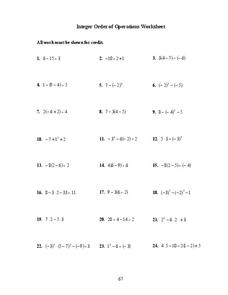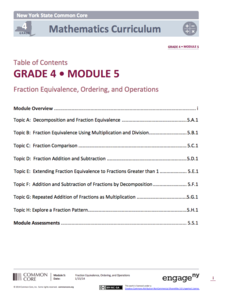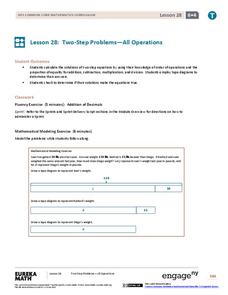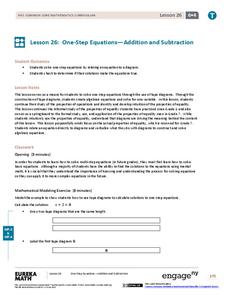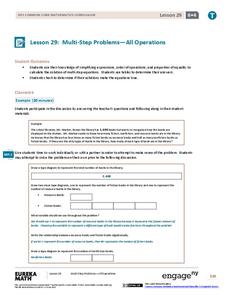Bob Prior
The Order of Operations
Your learners use many different number representations like positive and negative integers, exponents, radicals, and combinations of operations as they learn and strengthen their use of the order of operations. Thoughtfully organized to...
Willow Tree
Order of Operations
It's the classic please excuse my dear aunt sally strategy to remembering the order of operations. Young mathematicians practice to develop an understanding of the order of operations. Examples and practice problems include...
EngageNY
The Order of Operations
Future mathematicians learn how to evaluate numerical expressions by applying the order of operations. They evaluate similar-looking expressions to see how the location of parentheses and exponents affects the value.
Lone Star College
Integer Order of Operations Worksheet
Practice, assess, or review mathematicians' skills with this integer worksheet addressing order of operations using positive and negative integers, and solving equations in which letters stand for numbers.
EngageNY
Fraction Equivalence, Ordering, and Operations
Need a unit to teach fractions to fourth graders? Look no further than this well-developed and thorough set of lessons that takes teachers through all steps of planning, implementing, and assessing their lessons. Divided into eight...
Virginia Department of Education
Order Up!
Order in the math class! Scholars learn to evaluate expressions using the order of operations. A game has them rolling number cubes to determine numbers to use when evaluating.
CK-12 Foundation
Order of Operations: Barrels of Candy
We'd all love to have barrels of candy. An interactive shows the steps in evaluating a numerical expression that reflects the cost of buying several different barrels of candy.
Curated OER
Aunt Sally Poster
Please Excuse My Dear Aunt Sally is the mnemonic device for the order of operations featured on an informative and engaging mathematic poster.
National Research Center for Career and Technical Education
Business Management and Administration: Compound Interest - A Millionaire's Best Friend
Many math concepts are covered through this resource: percentages, decimals, ratios, exponential functions, graphing, rounding, order of operations, estimation, and solving equations. Colorful worksheets and a link to a Google search for...
National Security Agency
Introducing Integers and Their Operations
There's nothing negative about this mini-unit on integers! Engaging young mathematicians in a series of hands-on activities and collaborative learning opportunities, this resource offers an excellent way to introduce your class...
EngageNY
Two-Step Problems—All Operations
Step 1: Use the resource. Step 2: Watch your class become experts in solving two-step problems. Scholars learn to solve two-step word problems in context. They use tape diagrams and algebraic techniques to break the problem into two,...
CK-12 Foundation
Expression Evaluation with Basic Operations: Math Detective
Placement of parentheses is paramount. Scholars adjust the location of parentheses in a numerical expression so its value matches a given value. A slider interactive helps with this task.
Scholastic
Study Jams! Addition & Subtraction Equations
Zoe is decorating a cake for her grandpa's birthday and needs to know how many more candles to add. Follow along as she explains how to set up and solve algebraic equations in this step-by-step presentation. Equations with negative...
Project Maths
Complex Number Operations
What do animated videos have to do with mathematics? Using operations of complex numbers and their representations on the complex plane, high schoolers observe how mathematics could be used to move animations. The activity...
Cabrillo College
Elementary Algebra
Hello Algebra! If you're in need of a resource with a books worth of examples and practice problems, this is it. Some topics include linear equations, polynomials and exponents, rational expressions, quadratic equations, and a...
Math Learning Center
Grade 1 Supplement Set A5 – Number and Operations: Place Value
First graders work together to sort, categorize, and order collections of objects through activities that help build number sense.
Virginia Department of Education
Balanced
Bring balance to your lesson plans with an activity that asks individuals to solve one-step linear equations with inverse operations. Balance scales help learners understand the concept of isolating the variable.
Buffalo State
A Five Day Approach to Using Technology and Manipulatives to Explore Area and Perimeter
Young mathematicians build an understanding of area and perimeter with their own two hands in a series of interactive geometry lessons. Through the use of different math manipulatives, children investigate the properties of...
BW Walch
Linear & Exponential Functions
Positioned inside the framework of linear and exponential functions, this lesson is more of an investigation into the effects of changing variables and constants inside an expression. The author takes familiar formulas, those for...
EngageNY
Matrix Multiplication and Addition
To commute or not to commute, that is the question. The 26th segment in a 32-segment lesson focuses on the effect of performing one transformation after another one. The pupils develop the procedure in order to multiply two 2 X 2...
Scholastic
Study Jams! Distributive Property
The distributive property is a foundational skill taught two ways in this interactive web page. Your young mathematicians can practice their order of operations by solving distributive problems working from inside out. They then move on...
Illustrative Mathematics
The Sign of Solutions
Positive or negative, zero or no solution, are all possibilities for the solution of a linear equation. Here the resource gives examples of linear equations in one variable and their type of solutions. The resource comes with commentary...
EngageNY
One-Step Equations—Addition and Subtraction
Just one step is all you need to find success in solving equations. The 27th installment in a series of 36 teaches how to solve one-step equations involving addition and subtraction. Tape diagrams help future mathematicians in this task.
EngageNY
Multi-Step Problems—All Operations
Harness the power of algebra to solve problems. Young mathematicians learn to work out multi-step problems by applying algebraic techniques, such as solving equations and proportions. They use tape diagrams to model the problem to finish...



